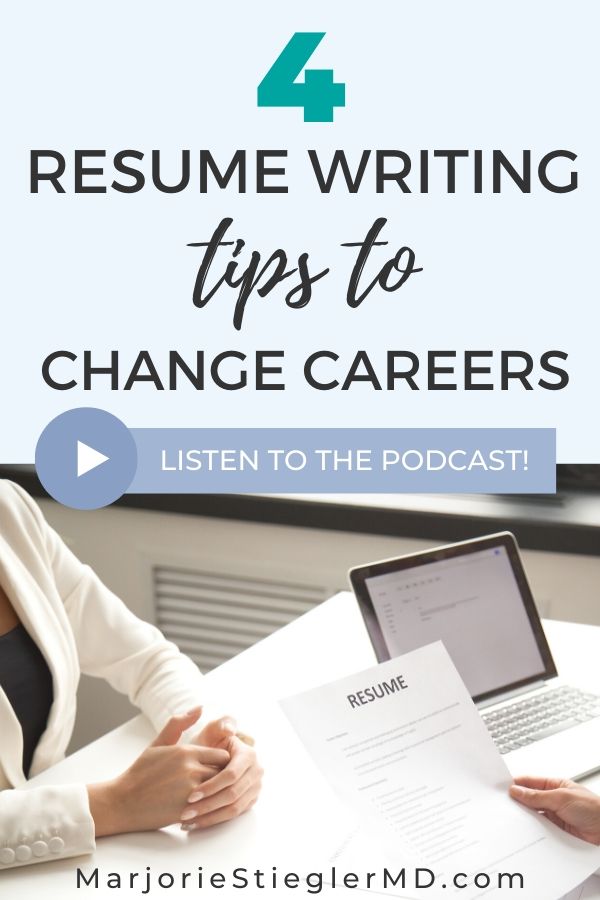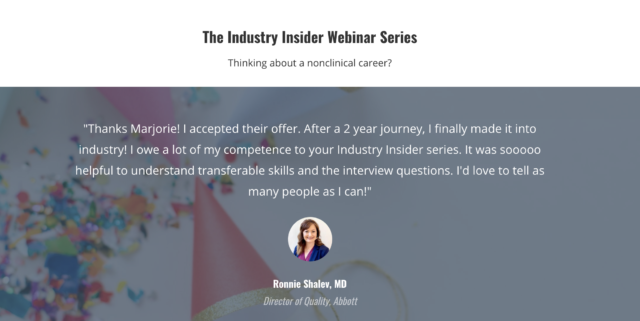Thinking About Leaving Clinical Medicine? These Resume Writing Tips Can Help (Episode 3)
Writing a professional resume is an incredibly important topic and it’s one that many people I think are afraid or even ashamed to ask about. So I want to start by acknowledging this.
A lot of people ask me for advice about how to find a non-clinical career. It’s not that surprising because doctors are increasingly frustrated with the modern healthcare system. They’re increasingly burned out.
Many doctors are interested in learning more about changing to non-clinical careers. If this is you, but you are not feeling ready to pursue this, I want to let you in on a secret…
You are NOT alone! I get contacted by doctors every single week who want to pick my brain about their options for non-clinical careers.
Now, I’m not a career coach, I don’t do personal one on one sessions and I don’t really have the bandwidth to do that, but I do feel you with this challenge. Having made a transition myself from a long successful academic career into a leadership role in industry, I know the entire process is so different from what physicians are used to. Writing a nonclinical resume, conducting a nonclinical job search, speaking to nonclinical recruiters, and crushing a nonclinical career interview – these are likely to put most doctors outside of their comfort zone. Good news – I’ve got some tips and tricks to share.
For a deeper dive, I also have a course called Industry Insider – click to check out the success stories of physicians like you who took the course and made the successful leap!
But rest assured, this is a very, very common question and for good reason.
In This Episode of The Career Rx You’ll Learn:
- How to use your resume writing skills to tell your story
- Tips to focus on your core competencies
- Communication skills and behaviors that are transferable
- To think of your resume as a marketing document that highlights your unique value proposition
LISTEN TO THIS EPISODE:
SUBSCRIBE TO THE CAREER RX PODCAST:
Want to get access to the latest podcast? Subscribe on your preferred podcast player…
Apple Podcast | Google Podcast | Spotify | TuneIn + Alexa | iHeart Radio
–
TRANSCRIPT AND SHOW NOTES
Resume Writing Tips For Doctors Thinking About Leaving Medicine

Hey there! Welcome to The Career Prescription (aka The Career Rx). I’m your host Marjorie Stiegler.
Let’s talk about one of the most important things you need to begin a conversation with a potential recruiter or leader in a non-clinical environment – an impressive professional resume that gets noticed.
If you are an academic physician, your CV format will be very far from what recruiters and hiring managers are used to seeing.
Even if you are interested in staying in academics, but moving into administration, it will really help to have this second resume fully developed. If you’re like me (mid-career and you have a bunch of accomplishments) you may have a very long resume.
One of the most striking differences is that your resume / CV may be quite long. Mine is nearly 50 pages and nobody in a non-clinical industry wants that!
A short, to the point resume, is the standard in the non-medical world.
The old advice is you’ve got to have a one-pager. One page, however, is a little unrealistic for some of us, but it really depends on how much experience you have.
I’m going to give you four resume writing tips so you can create something that will give you results in other industries.
Resume Writing Skills: 4 Tips For Success

Thinking of leaving medicine? Here are 4 important resume writing tips to use when updating your CV. #thecareerrx #resumetips Share on X
I’ll be the first to say that there’s a lot of work that would go into developing a really strong resume.
This is something you’re going to want to work on, refine and think about, especially if you have conversations with people outside of clinical medicine. You will see what they’re looking for, what they find appealing and what they would be interested in recruiting.
Resume Writing Tip #1: Only Share What’s Relevant
You do not want to have a multi-page chronological document.
What you want for your industry, CV or resume has to be something that really tells more of a story about you.
- Nix the chronological order business
- You can start with a summary of yourself
- You will, however, have your education and various work positions in chronological order
- Not all positions need to be included and many of them can be condensed – only list what is relevant for the new role you are interested in
Nobody needs to know about your progression from an instructor, to an assistant professor, to an associate professor in industry. They don’t care about that.
They may not even know what it means potentially. So you can condense some things.
Also, if you took a variety of different certifications, i.e. college, medical school and fellowship, those are probably not necessary. That could be a supplement. It depends on how many qualifications you have and whether your experience is relevant to the job you’re looking at.
What you want is a really short version of something that tells your skillset.
Illustrate this – what are the most important things that would paint a picture of how you solve problems?
Resume Writing Tip #2: Communicate Your Core Competencies
Let’s talk about storytelling and how you solve problems.
This resume writing skill is to replace tasks with competencies.
In your typical CV, you probably have a whole list of various types of publications or speaking describing your clinical or administrative work.
When looking for a new job outside of medicine it doesn’t help you or the recruiter/hiring manager for you to describe these tasks in a lot of detail. What you do want to do is talk about the skills you possess in order to be able to execute those tasks.
What do I mean by this?
As an anesthesiologist, for example, a lot of the tasks involve physical procedures and they also involve monitoring and synthesizing large quantities of data.
Instead of saying, “I observe someone’s blood pressure and breathing” and other metrics of homeostasis in the operating room, you want to describe your skills in a way that can be generalized and appreciated.
An example of what to say instead: In real-time I monitor multiple streams of data, synthesize and interpret the significance so that you can identify, predict and rapidly correct, things that have gone wrong.
And remember to share this skill in one sentence unless it’s directly relevant and they’re looking for your specialty in the nonclinical role, which is sometimes important. Example: If you’re looking at a pharmaceutical company in research and development, then they may well want to have that depth, but a lot of other opportunities don’t want that.
A big takeaway – Communicate what core competencies you have and how these skills are transferable.
Communicating Your Core Competencies: Example
“I really have no skills, I just have tasks. I sit in urgent care all day and I try to avoid inappropriate writing of antibiotics because everyone comes to me for antibiotics. So I would say though that there is a lot avoiding the writing of inappropriate antibiotics.”
How to translate this to a core competency that shows a transferable skill:
This physician is being a really good steward of healthcare resources because we know that there are downsides to overprescription of antibiotics. Include some of the competencies that describe the judgment call that goes into deciding what you’re going to do. And that’s what so much of medicine is all about.
Resume Tip #3: Focus on the Behaviors and Skills that are Transferable
Many physicians will say (and it, it hurts me every time I hear this) that they’re not trained to do anything else and they’re only just a doctor.
But in reality, when you think about the way in which you interface with a complicated healthcare system, your colleagues, administrators, patients, yourself, the technology, there are a lot of skills that are transferable.
So I’m going to rattle off a few skills that I think almost all doctors have. You can probably think of ways in which you’ve demonstrated these.
Desirable skills that are in high demand (that a physician would likely have):
- Leadership
- Teamwork
- Communication skills, particularly writing and speaking
- Self-directed learning, which is really important in any industry
- Relationship building, another skill that is extremely valuable in the business world
- Managing a team, including training, giving feedback/evaluations
- Metrics and quality improvement is tremendously desirable
These types of skills are highly transferable, so these must go on your resume.
Substitute some words on your resume, look at your different projects and think about them in this way.
You can also list some of these skills as being core competencies that can be at the top of your CV in an executive summary or core skills type of placement.
Resume Writing Tip #4: Make it a Marketing Document with a Value Proposition
You may be thinking, what on earth does this mean?
Well, you cannot expect somebody in a non-medical role to look at your resume and to be able to connect the dots for how that would apply to what they need.
So, you’ll want to have a clear value proposition included in your resume.
If you haven’t thought about professional branding language, that’s super important, please check out the blog. Here are some great articles for you to reference:
- Personal Branding for Physicians: What, Why and How to Get it Right
- Professional Branding 101: Free eBook
- Show Up and Be Seen: A Modern Guide to Professional Visibility
Areas of Focus for Professional Branding:
- Professional branding should be front and center. This will show who you are in terms of your experience, credentials and what you really bring to the table.
- Communicate your professional success metrics to quantify your value. This is a chance to show off your wins with numbers.
Resume Writing Skills When Leaving Medicine: Conclusion
Those are the four resume writing tips you need to make to make the career switch you’re looking for.
Before I wrap up, I’ve got to tell you, I know a lot of people really don’t want to do this, but each resume needs to be personalized for the job you’re applying to.
Ideally, you’d like to have your resume ready to go and to be able to fire it off to whoever is asking, however, personalization is imperative.
Having a standard resume will work for your academic CV, but it’s not going to work for something else. If you want to pivot into business and industry, administration, leadership or a major non-clinical career change for physicians, you will need to:
- Make sure that you tell your story
- Replace talking about tasks with communicating your core competencies
- Focus on your behavior and skills that are transferable
- Think of your resume as a marketing document where you outline your value proposition
- And of course, ensure you have a personalized resume
So go forth, take that crazy CV of yours and shape it into something that’s much more industry-friendly.
If you have questions get as I’d love to address your question and give you a shout out on a future episode.
–
Thanks for joining me on this episode of The Career Rx Podcast.
Please be sure to subscribe and leave me a review on Apple Podcast, Google Podcast or whatever podcast player you’re using to listen today. Also, be sure to send me your questions so that I can answer them and give you a shout out on a future episode.
Bye for now,
Marjorie
Related Career Tips & Resouces:
- Moving Up or Moving On? 4 Steps For Leadership Success.
- Professional Speaking for Career Advancement
- How To Land the Job You Want & Stop Getting Overlooked at Work
- 5 Worthless Career Tips for Women in Medicine + What To Do Instead
-PIN ME-










